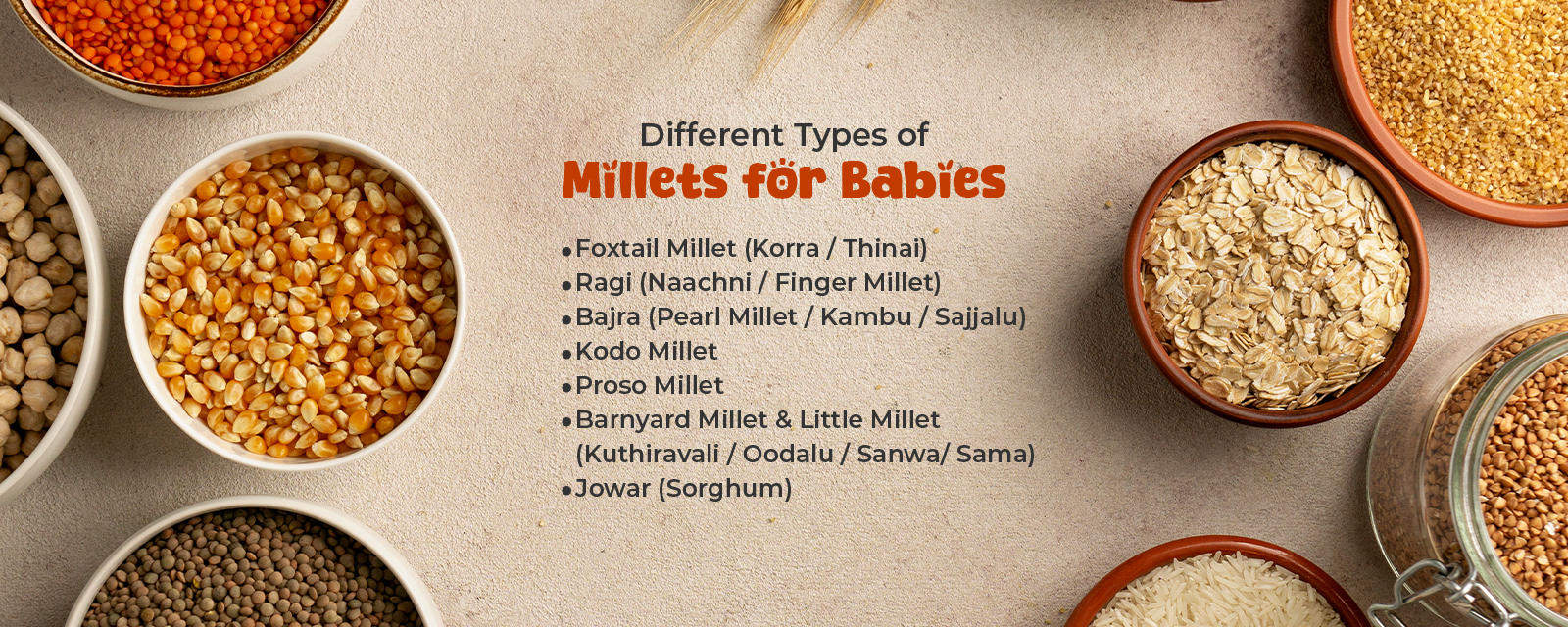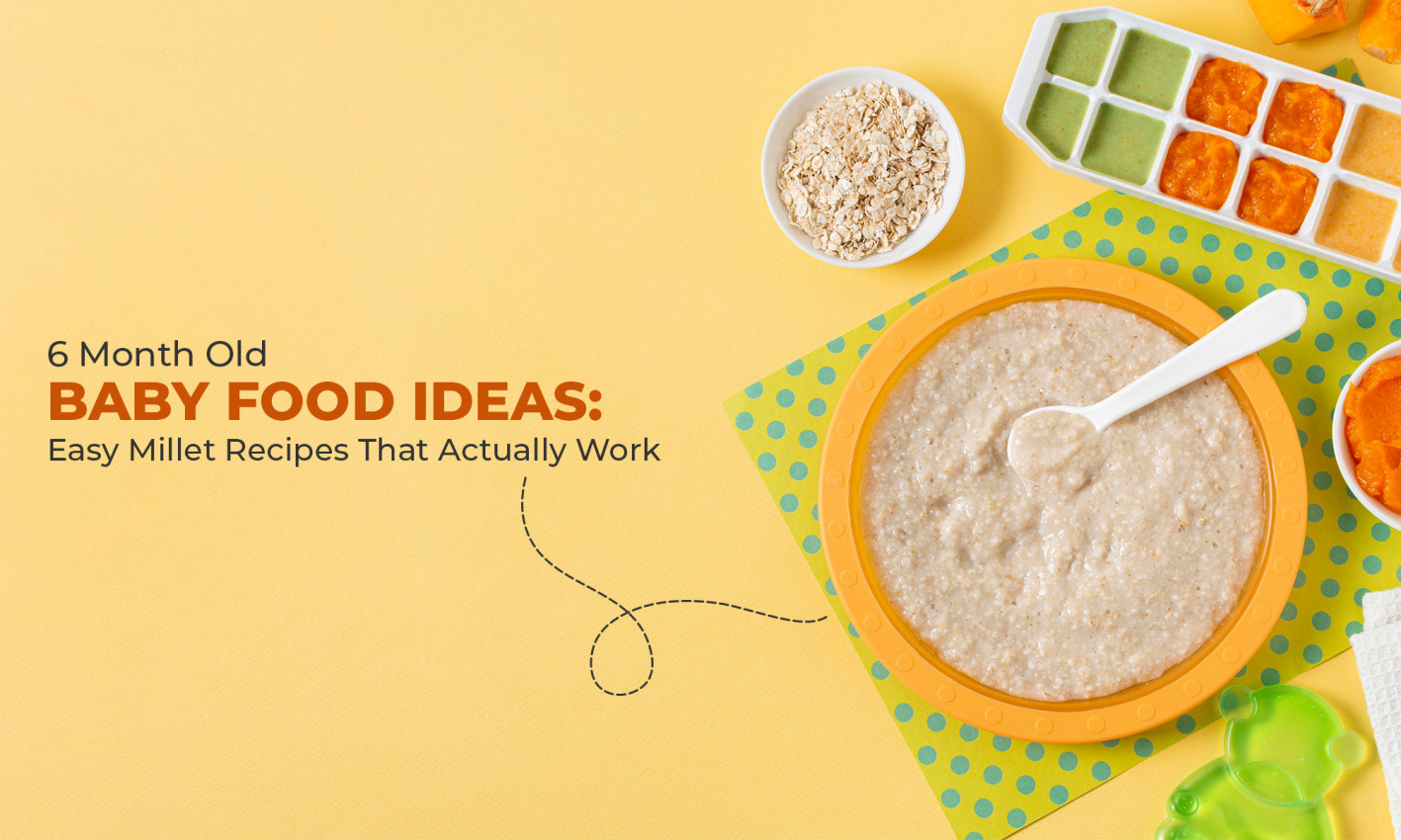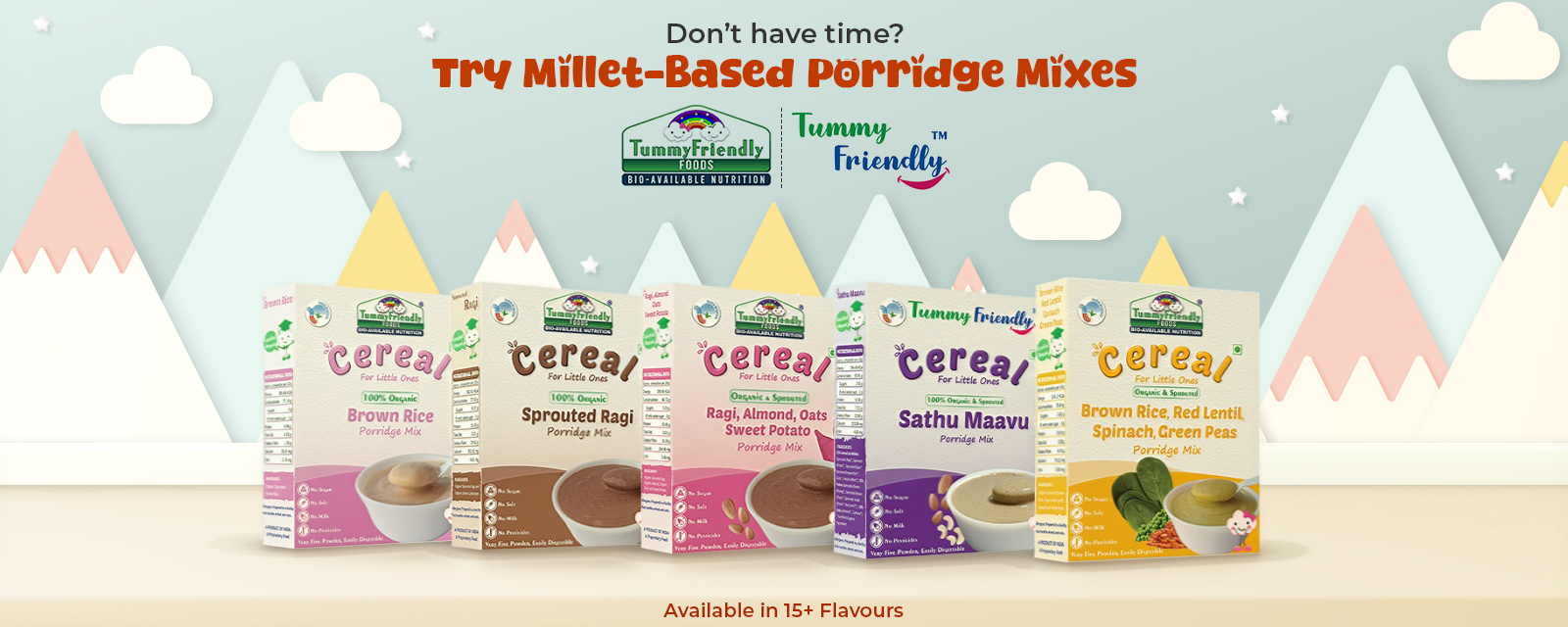At six months, most babies need to start solid foods as they are growing at a faster pace.
To meet the full spectrum of nutritional needs, breast milk or formula alone begins to fall short, and introducing complementary foods becomes essential.
Millet, an ancient grain, offers a gentle, nutrient-rich alternative to rice cereal and other single-grain options.
With the right recipes and approach, you can make millet your baby’s favourite first solid food.
Table of Contents:
|
Understanding When & Why to Introduce Millet:
According to the WHO, infants’ need for energy and nutrients begins to exceed what breast milk alone can provide. Complementary foods should be introduced at this age.
In India, the introduction of solid foods begins with a traditional ceremony of Annaprasana, performed between 6–8 months, depending on people’s own customs. This marks the baby’s first taste of solid food, usually a light cereal like rice or millet porridge.
Traditionally, Indian families feed homemade porridges, dals, and soft vegetable mashes as the first weaning foods. Ragi (finger millet) is especially popular in South India as a baby’s first solid, thanks to its high calcium and digestibility.
Pediatricians recommend starting with single-grain porridges like ragi, rice, or foxtail millet, then gradually include a variety of other millets, vegetables, and pulses. The emphasis should be on fresh, home-cooked, and minimally processed foods rather than packaged cereals.
Nutritional Breakdown: Millet vs. Traditional Options
| Nutrient | Millet Advantages | Why It Matters for 6-Month-Olds |
|---|---|---|
| Iron & Zinc | Millets like pearl millet are richer in iron than many white rice cereals. | Iron is critical at 6 months since fetal iron stores start depleting. |
| Fiber | Millet has more dietary fiber (aids digestion) than rice, which is almost all starch. | Helps prevent constipation and supports gut health. |
| Protein | Millet provides more plant protein per serving than typical rice cereal. | Protein supports growth and tissue repair. |
| Glycemic Index | Millets have a lower or more moderate GI compared to many polished rice products. | Helps stabilize blood sugar; avoids large spikes. |
Different Types of Millets for Babies:
You can choose from many types of unique millets for your baby’s first solid food. Here’s a quick breakdown:

Foxtail Millet (Korra / Thinai)
Rich in protein and fiber, foxtail millet has about 30x more fiber than rice. It can help strengthen your babies’ nervous system with its lecithin content and also keep them full for longer.
Ragi (Naachni / Finger Millet):
Known as the wonder millet for babies, calcium has 10 times more calcium than wheat or rice. South Indians prefer to use ragi as the babies’ first solid food, making malt, porridges, and integrating later as ragi roti in adolescence.
Sprouted ragi boosts nutrient absorption and is excellent for bone development and healthy weight gain.
Bajra (Pearl Millet / Kambu / Sajjalu):
Bajra has the richest amount of iron, nearly 19x more iron than rice. Also high in phosphorus and calcium, making it an ideal food to prevent anemia and support growth.
Kodo Millet:
Kodo millet contains around 11% protein with high fiber, vitamins, and minerals. Its protein quality is slightly better than foxtail millet, supporting steady growth and digestion.
Proso Millet:
High in lecithin and vitamin B6, proso millet can help in the growth of the nervous system health of babies. Proso also provides 24% of daily phosphorus needs per cup, which supports cell growth and immunity.
Barnyard Millet & Little Millet (Kuthiravali / Oodalu / Sanwa/ Sama):
Packed with iron (up to 18mg per 100g), barnyard millet is excellent for preventing anemia and boosting overall vitality. Little millet supports good cholesterol levels and offers complex carbs that digest slowly, keeping babies full longer. Also high in phosphorus (220mg per cup).
Jowar (Sorghum):
Rich in iron (8.45mg per cup) and B-vitamins like riboflavin and niacin (20–99x higher than rice). Iron absorption improves when paired with vitamin C-rich foods like oranges or amla.
You can check more nutritional facts and millet charts on milletindia.org.
How to Introduce Millet Step by Step by Age:
Start at 6 months of age when the baby starts showing readiness signs - sits with support, opens mouth for a spoon, and is able to swallow soft solids.
The texture of baby weaning food should be very thin, smooth, and porridge-like. As the baby becomes more comfortable (6-7 months), gradually move to slightly thicker, mashed, or soft lumps.
According to WHO and NHS guidelines, you can offer finger foods made from millet (cooked well, soft) after 8 months.
Give millet-based complementary foods 2-3 times a day for infants 6-8 months alongside breast milk.
Easy Millet Recipe Ideas for Baby:
Here are some sweet and savory millet recipes to try. These are simple, flexible; you can adjust ingredients based on what you have.
Smooth Foxtail Millet Porridge with Breast Milk
Take 2 tablespoons of foxtail millet flour (or finely powdered foxtail millet). In a pan, add ½–1 cup of water and cook the flour on low heat, stirring continuously to avoid lumps. Cook until it becomes soft, smooth, and porridge-like. Allow it to cool slightly, then mix in 2–3 tablespoons of expressed breast milk (never boil breast milk). Serve lukewarm.
This is gentle on the tummy, provides iron and slow-digesting carbs from foxtail millet, and combines well with the immunity-boosting properties of breast milk.
Foxtail Millet + Apple Purée
Wash and soak 2 tablespoons of foxtail millet for 1–2 hours. Cook the millet with 1 cup of water until very soft (you can pressure cook for faster results). Peel, core, and steam ½ apple until tender, then purée it smoothly. Blend the cooked millet and apple purée until you get a fine, smooth consistency (you can add a little warm water or breast milk to adjust texture).
This recipe is rich in fiber, vitamins, and minerals. The natural sweetness of apples makes millet more palatable for babies.
Foxtail Millet + Mashed Banana
Wash and soak 2 tablespoons of foxtail millet, then cook in 1 cup of water until very soft and mushy. Mash ½ a ripe banana thoroughly with a fork until lump-free. Mix the mashed banana into the cooked millet porridge. Add a little warm water or breast milk if needed for a smoother texture.
This combo gives quick energy (bananas’ natural sugars + potassium) along with the sustained energy and fiber from millet.
Don’t have time? Try Millet-based Porridge Mixes:
We know that busy parents don’t always have the time to wash, soak, sprout, roast, and cook grains from scratch every day. That’s where TummyFriendly Foods comes in - offering USDA-Organic & India-Organic Certified premixes designed especially for babies.
Ready in under 5 minutes, these premixes save you time without sacrificing health, available with varied ingredients and flavours.
What makes these premixes stand out?
- 100% Clean Nutrition – No sugar, no salt, no milk, no pesticides, no GMOs, and absolutely no chemical fortification. Just real, wholesome ingredients.
- Sprouted Superfoods – Sprouting grains and pulses multiplies their nutrition, making them easier to digest and richer in vitamins, minerals, antioxidants, amino acids, and essential fatty acids.
- Sattvic Goodness – Sprouts are considered sattvic food in traditional Indian diets, bringing lightness and natural energy to meals.
- Maximum Bio-Available Nutrition – TummyFriendly premixes deliver nutrition in its most natural, absorbable form. No extracts, no fillers — only real food.
- Made Fresh in Small Batches – Each batch is carefully prepared to ensure purity, freshness, and safety for your little one.
Important Points for Parents:
Introducing solid foods is a big milestone - one full of mess, experiments, and tiny victories.
Start with just 1–2 teaspoons once a day. Gradually increase the portion size as your baby accepts the taste and texture.
If you notice constipation or gas, thin the porridge more, add fruit puree for fiber, or give a little extra water between feeds.
With simple, sweet, and savory recipes, careful attention to texture, and plenty of patience, many babies come to love millet when rice or plain cereal fails.
Remember: rejection at first is normal. Some babies need 8–10 tries before accepting a new food. Patience and consistency are key!
Disclaimer: Readers are advised to consult qualified healthcare professionals before making dietary or health-related decisions.








